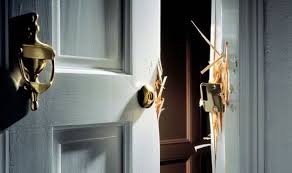|
Burglary
Simple burglary involves being in a place you don't have a right to be in. It doesn't require breaking and entering. If the door is unlocked and you enter without permission, its still a burglary. If you enter with permission but then remain without permission its still a burglary. This assumes you had an unlawful intent when the activity occured, such as the intent to commit a theft, a sexual crime or a different felony.
The location, or place, of the activity involved will determine the maximum punishment. If the location is a fixed structure such as a house then the maximum prison time is 34 months or just shy of 3 years. If its is a car or other means of transport, the maximum prison time is 17 months.
The specific statute which makes burlary an unlawful act is K.S.A. 21-5807 and it is set out as follows:
21-3715. Burglary. Burglary is knowingly and without authority entering into or remaining within any: (a) Building, manufactured home, mobile home, tent or other structure which is a dwelling, with intent to commit a felony, theft or sexual battery therein; (b) building, manufactured home, mobile home, tent or other structure which is not a dwelling, with intent to commit a felony, theft or sexual battery therein; or (c) motor vehicle, aircraft, watercraft, railroad car or other means of conveyance of persons or property, with intent to commit a felony, theft or sexual battery therein.

Burglary as described in subsection (a) is a severity level 7, person felony. Burglary as described in subsection (b) is a severity level 7, nonperson felony. Burglary as described in subsection (c) is a severity level 9, nonperson felony. Keep in mind this is for simple, not aggravated, burglary.
Aggravated BurglaryAggravated burglary is a much more serious crime than simple burglary. It occurs when there is a person inside the structure or vehicle and the defendant commits the burglary with the intent to commit a crime against that person.
Aggravated burglary is made an unlawful activity persuant to K.S.A. 21-3716 which defines the crime as knowingly and without authority entering into or remaining within any building, manufactured home, mobile home, tent or other structure, or any motor vehicle, aircraft, watercraft, railroad car or other means of conveyance of persons or property in which there is a human being, with intent to commit a felony, theft or sexual battery therein.
Aggravated burglary is a level 5 person felony which carries a maximum punishment of 136 months (or 11 years and three and a third months.).
Criminal TrespassA burglary charge is sometimes nothing more than an inflated case of criminal trespass where the defendant was in a place he had no permission to be, but no crime took place beyond that. Criminal trespass is a class B misdemeanor punishable by a maximum of six months in the county jail. If there was a restraining order in place which was violated a person must serve 48 consecutive hours in custody before they can be placed on probation. Criminal trespass is an unlawful activity in the State of Kansas by virtue of K.S.A. 21-3721, which is set forth below:
(a) Criminal trespass is: (1) Entering or remaining upon or in any land, nonnavigable body of water, structure, vehicle, aircraft or watercraft, other than railroad property as defined in K.S.A. 21-3761, and amendments thereto, or nuclear generating facility as defined in K.S.A. 2007 Supp. 66-2302, and amendments thereto, by a person who knows such person is not authorized or privileged to do so, and: (A) Such person enters or remains therein in defiance of an order not to enter or to leave such premises or property personally communicated to such person by the owner thereof or other authorized person; or (B) such premises or property are posted in a manner reasonably likely to come to the attention of intruders, or are locked or fenced or otherwise enclosed, or shut or secured against passage or entry; or (C) such person enters or remains therein in defiance of a restraining order issued pursuant to K.S.A. 60-1607, 60-3105, 60-3106, 60-3107, 60-31a05 or 60-31a06 or K.S.A. 2007 Supp. 38-2243, 38-2244 or 38-2255, and amendments thereto, and the restraining order has been personally served upon the person so restrained; or (2) entering or remaining upon or in any public or private land or structure in a manner that interferes with access to or from any health care facility by a person who knows such person is not authorized or privileged to do so and such person enters or remains thereon or therein in defiance of an order not to enter or to leave such land or structure personally communicated to such person by the owner of the health care facility or other authorized person.
|

